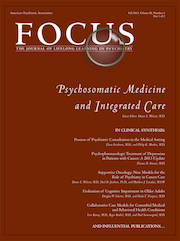Psychiatric Aspects of Organ Transplantation
Abstract
Psychiatrists working with transplant populations need to understand the organ transplant process, transplant-specific psychosocial issues, and the medical complexity of organ transplant candidates and recipients in order to provide appropriate psychiatric care. Strategies for psychiatric assessment and treatment have been developed with these transplant-related issues in mind. Patients with complex psychiatric histories present particular challenges to the transplant team and specific considerations in these cases are discussed. For living organ donors the psychiatrist’s role focuses on the protection of the psychological health and well-being of the donors and the pre-donation assessment must consider risks for poor post-donation psychosocial outcomes. Following transplantation, nonadherence to transplant directives is a significant problem in transplant recipients, and psychiatrists may be asked to assist in developing/providing strategies to improve patient adherence.



